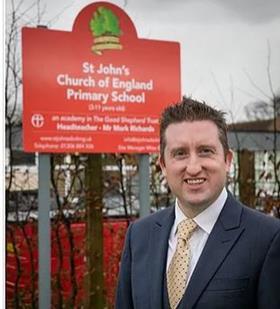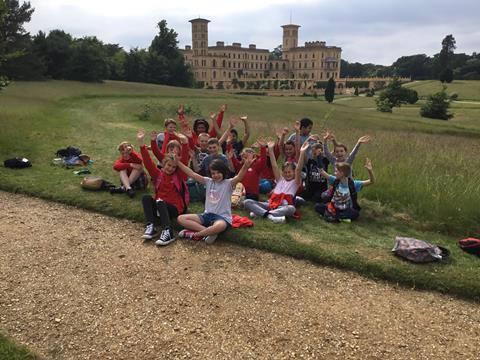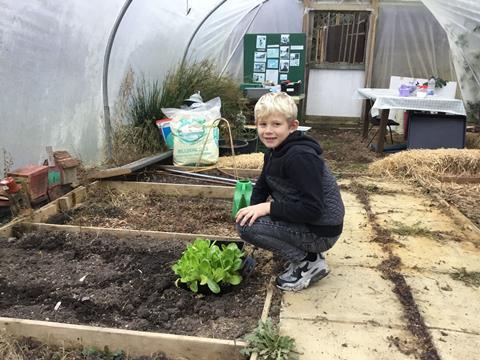After being voted number one school in Surrey, Shannon Clark spoke to St John’s C of E Primary School’s head teacher Mark Richards to find out what part learning outside the classroom had in their transformational journey.

Could you tell us a bit about the school’s progress in recent years?
The school has definitely been on a journey. In 2013 the school was rated inadequate by Ofsted. In April 2015 I started and I was the ninth head teacher in nine years so there had been a huge amount of turbulence for the students.
The school sits in an area of quite high deprivation, with 51% of our students classed as disadvantaged children and the focus, by the sounds of things, was always on that but in the past few years we’ve really focused on the learning instead.
We are now number one for the progress that our students have made from Year 2 through to Year 6 in reading, writing and Maths.
How important is learning outside of the classroom to you as a school?
Outdoor learning is really key, certainly for some children who find that formal learning doesn’t come as easily. With our farm, it lends itself quite naturally to the classes using the outdoors. Last year the community built us a learning lodge and that just has hay bales in there but classes can go to use it as an alternative to the standard classroom. We’ve also got two ponds and a small wooded area that can be used.
Each year we take Year 6 to the Isle of Wight for a week in the summer. The Year 4 students go to PGL in Hindhead and then every half term all year groups either have a visitor in, or they go out on a school trip, for example our nursey children went to RHS Wisley last month.

What would you say is needed to make a great school trip?
It’s got to be focused on the learning, that’s the number one thing. It can’t just be a jolly, even if that is what the children see it as.
The trip to the Isle of Wight for example, has the children already completing work leading up to it. For example, they might learn about Victorian Britain in school, then during the trip they will visit Queen Victoria’s holiday home on the island, looking at the artefacts there. While there they can also participate in a Discovery Visit, where they become servants in the Queen’s household and interact with it. But the main thing is that the trip has to be relevant to what they are learning about.
How do you ensure that learning outside of the classroom is accessible to all of your students?
It’s not an option for it to not be available for all. If parents can’t afford to send their children on school trips, we have a pupil premium grant from the government to help them out.
We’ve also just installed a new immersive Discovery room. There are three walls that are interactive, the floor vibrates and there are 400 smells, with hundreds of different scenes available to pick from. We also have a 360-degree camera that we take on school trips. The Year 6’s recently went to a farm in Kent and they took the camera with them so now it can be plugged in to the room and we can take all of our students on journeys beyond the classroom walls, even if they can’t physically leave.
What do you think of the announcements that Ofsted are changing their framework (including more emphasis on ‘extra-curricular/school trip’ activities?
Well I think that our curriculum lends itself quite nicely to the new Ofsted framework as our Harmony curriculum is about bringing all of the subjects together and focusing on more than just English and Maths. I might be the only head teacher in the country that is excited about it but I think we are in a really exciting state of our development with this curriculum – we’ve only scratched the surface at the moment.

Could you give us some more details on your Harmony curriculum?
Harmony is based on the Prince of Wales’ book, Harmony: A New Way of Looking at Our World, in which he talks about how everything in our world is connected. An example he gives is that our hearts sit at 24 and ½ degrees, which is exactly the same angle at which the Earth is tilted in relation the solar system.
When you dig deep into how everything is connected, it’s quite inspirational and so our curriculum focuses on the seven principles that he talks about in the book.
Do you plan to link the Harmony curriculum into learning outside of the classroom?
Yes, so we have a farm onsite at the school and each class has their own allotment patch, with the fruit and vegetables that are harvested there then used in our kitchens. We now also have two year groups responsible for placing the waste food from the kitchens onto the compost heap, which has helped them to see that cycle, to understand their responsibilities and to connect their eating to the wider world – which is something we focus on in the curriculum.
As our annual Year 6 trip to the Isle of Wight this year will be our first for the Harmony curriculum, the staff will be finding places on the island to visit that can be linked to the work done back in class.










